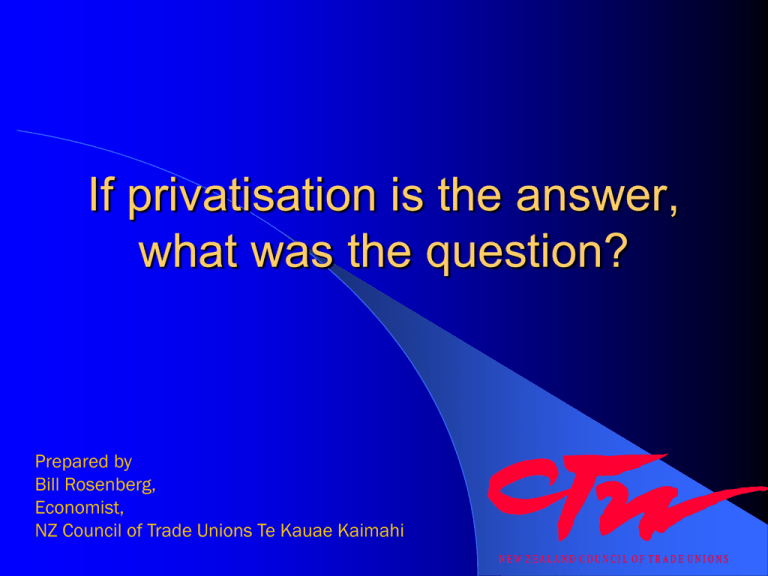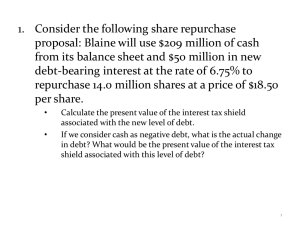Document Management - New Zealand Council of Trade Unions
advertisement

If privatisation is the answer, what was the question? Prepared by Bill Rosenberg, Economist, NZ Council of Trade Unions Te Kauae Kaimahi The government has announced plans to “partially privatise” three electricity SOEs and Solid Energy and increase the private ownership of Air New Zealand. It is privatising the work account of ACC by opening it to private competition. It is entering into “Private-Public Partnerships” (PPPs) in schools and prisons and is considering them in hospitals, courts and elsewhere. This presentation gives reasons why it is important to oppose another round of privatisation. Appalling experience New Zealand Rail, Air New Zealand – See below – failed and had to be bought back by government Telecom – See below Banks – BNZ, Postbank – Had to recreate Kiwibank, still gaps in financial market Government Printing Office – Sold far below value – subsidy to start Graham Hart’s empire Radio New Zealand commercial stations – Commercial radio now dominated by two overseas companies Electricity – Contact Energy, Trustpower, local network operators – Continued price rises, insufficient generating capacity Housing Corporation mortgages – Many home owners disadvantaged And many more 3 Two examples: 1. Telecom Privatised for $4.25 billion, 1990 New owners sold out from 1997 making capital gains and dividends of $10 billion Paid out most of its profits in dividends About three-quarters go overseas Failed to reinvest, e.g. broadband: public now paying Laid off thousands of workers, undermined union representation Resisted competition every step 4 Two examples: 2. NZ Rail Privatised in 1993 for $328m New owners overseas investors and Faye Richwhite who organised the sale – paid $107m, borrowed rest “Were responsible for stripping out $220.9m in 1993 and $100m in 1995” – Gaynor, NZ Herald. 5 Two examples: 2. NZ Rail Sold out for total profits of $370m Rail and rolling stock neglected. Appalling safety record for staff and passengers Toll sold to government for over $700m Cost to govt will be almost $4 billion 6 Why did they do it? We were told in the 1980s and 1990s: “to pay off debt” – Government debt was very high in the 1980s In fact – Roger Douglas (1993): “I am not sure we were right to use the argument that we should privatise to quit debt. We knew it was a poor argument, but we probably felt it was the easiest to use politically.” 7 Why did they do it? Richard Prebble (1990): asset sales should not be for the purpose of repaying debt, but because he was "sceptical about the ability of any government to run its business well”. In other words, the reason is ideological It just moved government debt to private debt 8 Overseas Debt as percent of GDP 1983-2010 150% 130% 110% % GDP 90% Gross Private Debt 70% 50% Gross Government Debt 30% 10% -10% 1983 1986 1989 1992 Net Private Sector Debt 1995 1998 2001 Net Total Debt 2004 2007 2010 Net Govt Debt 9 The debt situation Government debt very low compared to other high income countries Even at its likely peak, will be below average Only about half of it is owed overseas Net government debt as percent of GDP 2011 (IMF estimates) Japan Greece Italy Belgium Portugal Iceland United Kingdom United States Ireland Spain Germany Netherlands Latvia Switzerland Canada New Zealand Australia Denmark Sweden Finland -50 0 50 Percent of GDP 100 150 10 The debt situation But total overseas debt is very high and has been since the 1990s – two decades of neglect Almost all private debt. About 70% is bank debt. On top of high overseas ownership of companies Borrowing to pay the interest and dividends 11 The debt situation Do have to reduce overseas debt and government debt But the current government debt was run up to keep the economy moving, during the recession We’re not out of it yet! High risk of going back into recession if government cuts spending and debt too soon 12 Will selling off public assets help? Raises funds to pay off government debt or pay for spending that would otherwise have to be borrowed But on that logic we should sell up everything The real question is the public benefits they provide The ones that are easily sold are probably bringing us greater returns than the cost of debt 13 Will selling off public assets help? If they sell for a high price, then watch out for price increases and downgraded services Even raising $7-10 billion would barely dent total overseas debt of $250 billion – and then only if sold overseas If sold overseas, just swaps one liability (debt) for another (overseas ownership of a company) There are other alternatives 14 If not to pay off debt, what for? Argument: Government has no business being in …” (fill in the gap – rail, airlines, electricity, banking…) But publicly owned assets have many benefits including Preventing profiteering in important e.g. electricity, Kiwibank, services which are a monopoly or water, post close to it Ensuring essential services are provided fairly and affordably e.g. water, waste water, social welfare, superannuation Providing security of services e.g. electricity, coastal shipping, public transport 15 If not to pay off debt, what for? Argument: Government has no business being in …” (fill in the gap – rail, airlines, electricity, banking…) But publicly owned assets have many benefits including Social solidarity, and services which e.g. ACC, are more efficient to provide superannuation, social universally welfare Providing services, innovation, long term development when the private sector fails to Providing additional income to the government e.g. public transport, roading, Air NZ, rail, Solid Energy e.g. Electricity, Kiwibank, Solid Energy, Air NZ 16 If not to pay off debt, what for? Argument: “the private sector is more efficient” But many public operations are highly efficient – e.g. Electricity companies – why else is the sharemarket interested? Compete effectively against private Solid Energy – competes internationally, innovates ACC - shown to be one of the most efficient in the world Air New Zealand – private ownership crashed it; now one of the world’s few profitable airlines New Zealand Post – sells advice internationally Kiwibank – leads banks in service and interest rates 17 If not to pay off debt, what for? Argument: “the private sector is more efficient” International studies tell the same story: efficiency is about good management, not private or public ownership Anyway – profitability is not all that matters If they strengthen our public services and infrastructure, they can make the rest of the country more efficient 18 If not to pay off debt, what for? Argument: “the private sector has easy access to finance, but the government doesn’t want to raise taxes” A weak argument – Used for “PPPs” – government putting them into schools, prisons, considering hospitals, courts, roads etc – Government can borrow more cheaply – Government can borrow more easily following the financial crisis – PPPs effectively an expensive form of debt 19 If not to pay off debt, what for? Argument: “the private sector has easy access to finance, but the government doesn’t want to raise taxes” A weak argument – International experience (e.g. UK, US) shows they can be hugely wasteful – Complex – cost of London underground PPP £455 million just to set up the PPP! Great for lawyers etc – They give the private operator a 30 year monopoly – Cut staff and pay to cut costs – Tax levels are a political issue 20 If not to pay off debt, what for? Argument: “partial privatisation is in the interests of deepening New Zealand’s weak capital markets and providing safe investment opportunities, for ‘mum and dad’ investors. Share market scrutiny will improve the management of these firms.” In fact Shares will end up overseas owned (remember local electricity networks) – In many cases, international trade agreements force us to accept this Share market scrutiny is about financials only – for example not about price fixing – It encourages short term thinking, deadly for quality infrastructure and public services Even Treasury is sceptical about this argument It won’t help savings – just moves money from private to public sector 21 If not to pay off debt, what for? Argument: “partial privatisation is in the interests of deepening New Zealand’s weak capital markets and providing safe investment opportunities, for ‘mum and dad’ investors. Share market scrutiny will improve the management of these firms.” All this will undermine the SOEs’ ability to work in the public interest Example: electricity companies – Electricity system should balance: – – – – – security of supply, environmental impact, low prices Focus on profits doesn’t allow balance – problem with current set-up Private shareholders will demand higher dividends A high sale price will increase this pressure The flexibility that comes from full public ownership will disappear So more price rises, shortages, and reliance on fossil fuels 22 What can be done? • Rule number one: don’t panic • There is a debt problem, but we shouldn’t be panicked into short-sighted “fixes” – or using a crisis for political ends • Must keep up government spending during recession • The problem is not government debt 23 What can be done? • There is zero likelihood government won’t be able to repay its debt unless – the banks call on the government again for help • The Big Four banks are still borrowing heavily overseas • So restrict their overseas borrowing and set limits to them falling back on the government • Take precautions to slow down “hot money” flows in and out of the country 24 What can be done? • If a crunch comes, it will be because money markets stop renewing loans. May affect banks more than govt (as in 2008). • Better short term ways to raise funds than privatisation if crisis: examples – Stop ACC’s “full funding” policy, use some of its Fund to pay off debt (keep enough reserves); – Use some of the NZ Super Fund • Longer run: Increasing savings will help, but slowly – But as much a problem of poor investment as poor savings – Ignores huge income inequalities in New Zealand – many can’t save – Public ownership gives most “mums and dads” a greater stake 25 What can be done? – Workers are not getting a fair share. Strengthen collective – – – – – bargaining Encourage investment through government Kiwibonds for financing infrastructure, and bonds in SOEs, not shares Increase the quality of overseas investment Boost Kiwisaver– compulsory with employer contributions rising to 6% and help for low income people Encourage Kiwisaver and NZ Super funds to invest more in New Zealand Make better use of these funds to support growing New Zealand firms 26 Say no to privatisation – in all its forms 27






